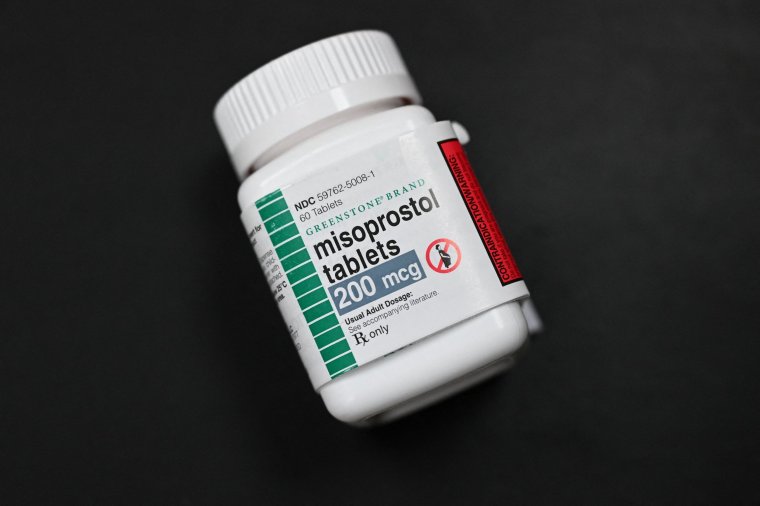Abortion rights in the United States have suffered a major setback as conflicting court rulings over the legality of an abortion pill which has been widely available for more than 20 years sets up for a legal showdown.
A US judge in Texas on Friday suspended the two-decade-old approval of the abortion pill mifepristone, one of the two drugs commonly used to end a pregnancy, while a legal challenge proceeds.
Trump-appointed federal judge Matthew Kacsmaryk in Texas halted the Food and Drug Administration’s (FDA) longstanding approval of mifepristone, which is used in most abortions.
However, an hour later, an Obama-picked judge in Washington, district judge Thomas Rice, essentially ordered the opposite and directed US authorities not to make any changes that would restrict access to the drug in at least 17 states where Democrats sued in an effort to protect availability.
The duelling court orders make it likely that the issue will escalate to the US Supreme Court.
In a 67-page opinion, Judge Matthew Kacsmaryk suspended the FDA’s approval of mifepristone. The ruling will not go into effect for seven days to allow the government time to appeal.
The US Department of Justice has confirmed it will challenge the Texas ruling.
Judge Kacsmaryk’s decision could limit access to the drug for millions of women in the US. Legal analysts say the ruling threatens to upend the entire foundation of America’s drug regulatory system.
Mr Kacsmaryk’s ruling is a preliminary injunction that would essentially ban sales of mifepristone while the case by anti-abortion groups before him continues. The judge, who previously worked for the hardline evangelical First Liberty Institute and was appointed to the bench by Donald Trump, has not yet made a final ruling on the merits of the challenge.
However, in his ruling, he found that the lawsuit is substantially likely to succeed. He said that the US FDA had ignored risks in approving the drug. “The Court does not second-guess FDA’s decision-making lightly,” he wrote. “But here, FDA acquiesced on its legitimate safety concerns – in violation of its statutory duty – based on plainly unsound reasoning and studies that did not support its conclusions.”
The case was brought by four anti-abortion groups headed by the recently formed Alliance for Hippocratic Medicine and four anti-abortion doctors who sued the FDA in November.
They contend the agency used an improper process when it approved mifepristone in 2000 and did not adequately consider the drug’s safety when used by girls under age 18 to terminate a pregnancy.
The ruling will likely inflame the fraught US politics of abortion, which have divided the country since last year’s US Supreme Court ruling that overturned a woman’s constitutional right to the procedure.

“Democrats will do everything in our power to fight back to ensure access to safe and legal abortion is protected, and voters will hold every last Republican accountable for an extreme anti-choice agenda,” said Jaime Harrison, the chair of the Democratic National Committee.
Since the Supreme Court ruling, 12 of the 50 states now ban abortion outright while many others prohibit it after a certain length of pregnancy, according to the Guttmacher Institute, a research organisation that supports abortion rights.
Mifepristone is part of a two-drug regimen, administered in combination with misoprostol, for medical abortions in the first 10 weeks of pregnancy. The drugs account for more than half of all abortions in the country.
Some abortion providers have said that if mifepristone is unavailable, they would switch to a misoprostol-only regimen for a medical abortion, which is not as effective. It is not yet clear how widely available it would be.

The Biden administration, responding to the lawsuit, said the drug’s approval is well supported by science and that the challenge comes much too late.
US district court judge Thomas Rice in Spokane, Washington, in a separate lawsuit, issued a preliminary order blocking the FDA from making any changes to the current availability of mifepristone. His ruling applied to the 17 states that sued.
Greer Donley, associate professor at the University of Pittsburgh Law School, said there was “definitely a direct conflict” between the Texas and Washington orders, which could bring the case before the US Supreme Court more quickly.
Mifepristone is available under the brand name Mifeprex and as a generic. Mifeprex maker Danco Laboratories on Friday filed a notice that it would appeal Kacsmaryk’s decision.
The FDA in January said that the government for the first time will allow mifepristone to be dispensed at retail pharmacies.
Mifepristone is also used to treat women who have suffered miscarriages and Cushing syndrome, a hormone-related condition.
The contradictory decisions increase the chances that the fate of the drug will ultimately be decided by the Supreme Court, which overturned the federal right to abortion last year.
President Joe Biden said his administration would fight the Texas decision. “If this ruling were to stand, then there will be virtually no prescription, approved by the FDA, that would be safe from these kinds of political, ideological attacks,” he said in a statement.
Vice-president Kamala Harris said the ruling “threatens the rights of women nationwide to make decisions about their healthcare and the ability to access medication prescribed to them by their doctors”.
The attorney general, Merrick Garland, said in a statement: “The justice department strongly disagrees with the decision of the district court for the northern district of Texas in Alliance for Hippocratic Medicine v FDA and will be appealing the court’s decision and seeking a stay pending appeal.
“Today’s decision overturns the FDA’s expert judgment, rendered over two decades ago, that mifepristone is safe and effective.”


